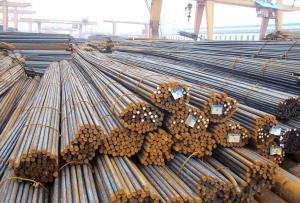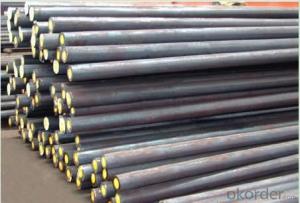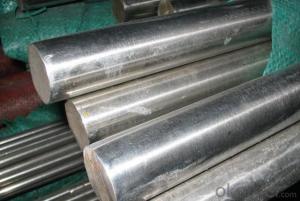SAE 1035 Carbon Steel Round Bar CNBM
- Loading Port:
- Shanghai
- Payment Terms:
- TT or LC
- Min Order Qty:
- 25 m.t.
- Supply Capability:
- 500000 m.t./month
OKorder Service Pledge
OKorder Financial Service
You Might Also Like
Item specifice
SAE 1035 Carbon Steel Round Bar
Product Description:
1. Sizes: Diameter: 16mm-300mm; Length: 6m, 9m, 12m
2. Grade: 35#, SAE1035, S35C, C35
3. Invoicing on theoretical weight or actual weight as customer’s request
4. Shape: Round bar, solid bar of steel with circular section
5. Technique: Hot rolled, forged, cold rolled
Chemical Composition:
| C | Si | Mn | P | S | Ni | Cr | Cu |
| 0.32-0.40 | 0.17-0.37 | 0.50-0.80 | ≤0.035 | ≤0.035 | ≤0.30 | ≤0.25 | ≤0.25 |
Packing and Delivery:
Packing in bundle with steel strips and shipped by break bulk vessel or container (depend on target market and different ports)
Delivery Detail: Approx.45 days
Usage and Applications
1. Steel round bar is used in a large number of architectural and engineering structures. Or it can be used in construction of plants for the production of steel house frames, high-voltage transmission towers, bridges, vehicles, boilers, containers, ships, etc.
2. And we can use this kind of product on the performance of the mechanical parts if the demand is not very high.
3. Some especial material steel round bar can be used for main shaft of steamer, hummer shank, with big section and supper force.
Specification:
OD | Length | Material | Standard | Technique |
16-260mm | 6-12m or aques per request | 20# | GB ASTM DIN | Hot rolled |
16-350mm | 35# | |||
200-500mm | 35# | Forged | ||
20-250mm | 20Cr,40Cr,20-42CrMo | Hot rolled | ||
50-300mm | GCr15 |
Main product pictures:
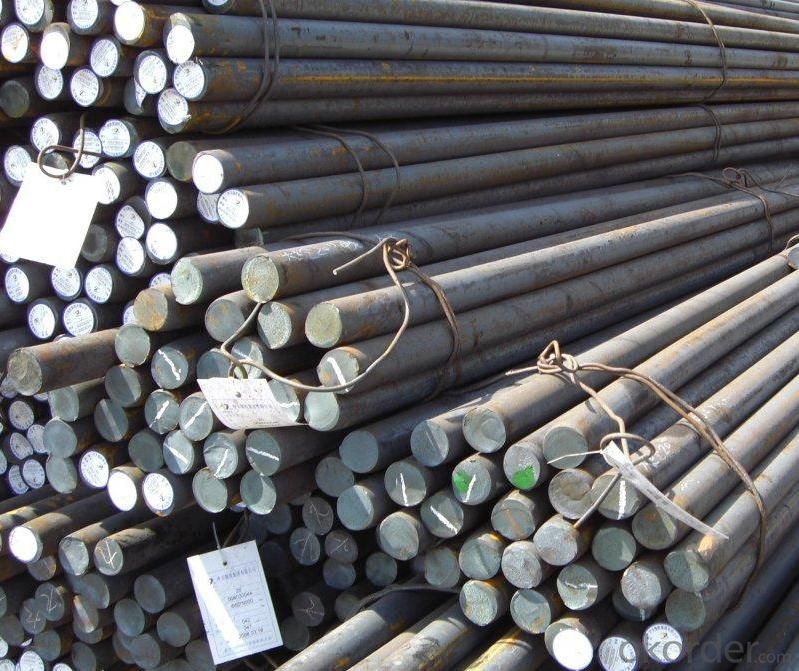
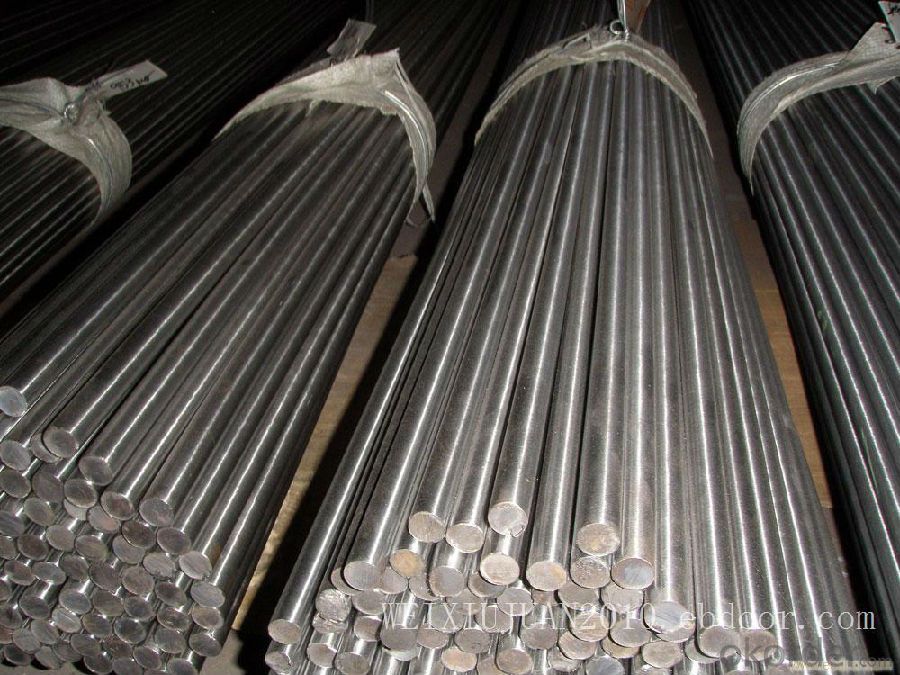
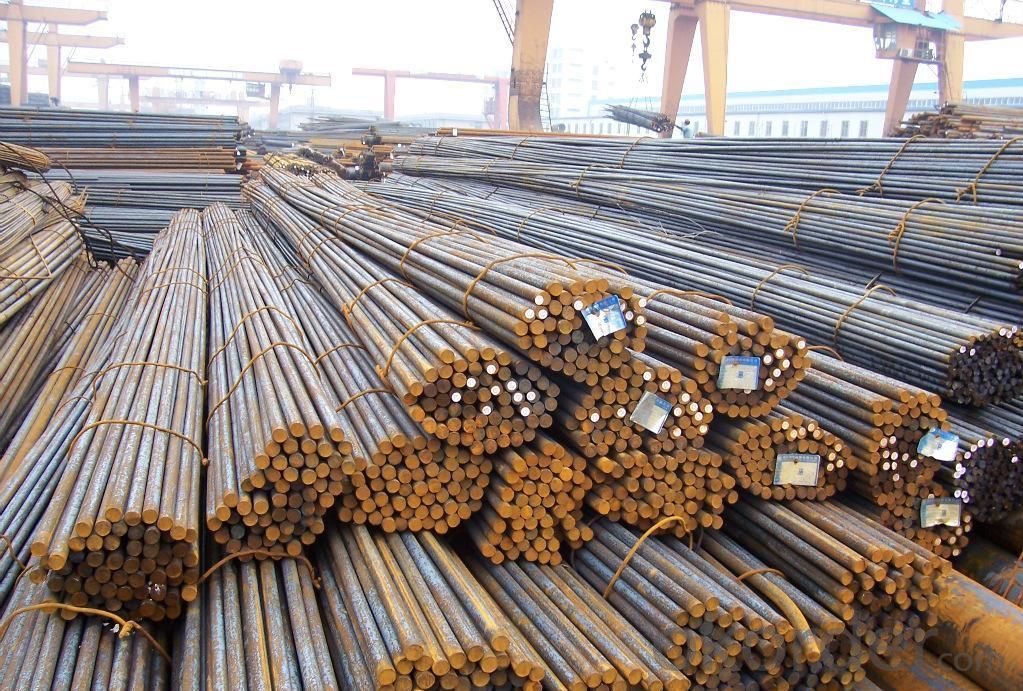
- Q:What are the properties of high-strength stainless steel?
- High-strength stainless steel possesses several key properties such as excellent corrosion resistance, high tensile strength, good ductility, and resistance to extreme temperatures. This type of steel also offers exceptional durability, making it suitable for various demanding applications in industries such as automotive, aerospace, and construction.
- Q:How does special steel perform in marine environments?
- Special steel is specifically designed to withstand the harsh conditions of marine environments. It offers superior corrosion resistance, high strength, and excellent durability, making it highly suitable for applications in marine settings. This type of steel can effectively resist the corrosive effects of saltwater, moisture, and other environmental factors, ensuring long-term performance and reducing maintenance requirements.
- Q:What are the main characteristics of tool steel?
- Tool steel is a type of steel that possesses several key characteristics, including high hardness, wear resistance, toughness, and heat resistance. It is specifically designed to be used in the production of tools and dies, where it needs to withstand intense pressure, abrasion, and high temperatures. Additionally, tool steel has the ability to retain its shape and sharpness even under heavy use, making it highly durable and reliable for various industrial applications.
- Q:What is the significance of vanadium in special steel?
- Due to its unique properties and effects on the performance of steel, vanadium is an important element in special steel. Special steel, which is designed for specific applications requiring strength, durability, and specific characteristics, benefits greatly from the inclusion of vanadium. One of the primary rationales behind using vanadium in special steel is its ability to increase the steel's strength and toughness. Vanadium forms robust carbides within the microstructure of the steel, which prevent grain growth and enhance its resistance to deformation and cracking. This makes the steel highly suitable for applications that demand exceptional strength, such as the construction of bridges, high-rise buildings, and machinery. In addition to strength, vanadium also improves the hardenability of the steel. Hardenability refers to the steel's capacity to be hardened through heat treatment methods like quenching and tempering. Vanadium enhances the hardenability of the steel, enabling easy achievement of desired properties like increased wear resistance and improved cutting performance. This makes vanadium-containing special steel ideal for tools, dies, and other applications requiring hardness and wear resistance. Furthermore, vanadium contributes to the steel's resistance to corrosion. It creates stable oxide layers on the steel's surface, acting as a protective barrier against corrosion and oxidation. This is particularly advantageous in harsh environments like marine environments or chemical processing plants. Moreover, vanadium also enhances the heat resistance and thermal stability of special steel. It helps the steel retain its strength and hardness even at high temperatures, making it suitable for applications involving high-temperature environments like aerospace components and automotive engine parts. In summary, the importance of vanadium in special steel lies in its ability to enhance the steel's strength, toughness, hardenability, corrosion resistance, and heat resistance. These properties make vanadium-containing special steel highly sought after in various industries that require exceptional performance and reliability.
- Q:How does special steel behave under different types of loading conditions?
- Special steel, also referred to as alloy steel, displays distinctive characteristics when subjected to different types of loads. It is specifically engineered to possess exceptional mechanical properties, rendering it suitable for a diverse range of applications where high strength, toughness, and resistance to wear or corrosion are necessary. Under tension loading, special steel demonstrates remarkable tensile strength and ductility, allowing it to endure pulling forces without easily fracturing. This property makes it ideal for applications where components are exposed to pulling or stretching forces, such as cables, structural elements, or automotive parts. When subjected to compressive loading, special steel showcases its exceptional ability to withstand forces that attempt to squeeze or press it together. This renders it suitable for applications like hydraulic cylinders, crankshafts, or flanges, where resistance to compression is essential. In terms of bending or flexural loading, special steel exhibits outstanding flexibility while retaining its strength, enabling it to endure repeated bending without deformation or failure. This property is particularly advantageous in applications involving springs, suspension systems, or beams exposed to dynamic loads. Special steel also possesses excellent fatigue resistance, which means it can endure cyclic loading or repeated stress without failure. This property is crucial in applications subjected to continuous or repetitive loading, such as turbine blades, gears, or axles. Furthermore, special steel effectively handles impact loading due to its high toughness and impact resistance. This makes it suitable for applications where sudden shocks or impacts are anticipated, such as hammer heads, drill bits, or armor plating. In terms of temperature loading, special steel retains its mechanical properties even at high temperatures due to its exceptional heat resistance. This property makes it suitable for applications exposed to extreme heat or thermal cycling, such as turbine components, exhaust systems, or molds utilized in metal casting. To summarize, special steel exhibits different behaviors under various loading conditions, adapting its mechanical properties to meet the specific requirements of each application. Its unique combination of strength, toughness, ductility, and resistance to wear or corrosion make it a versatile material capable of enduring different types of loading conditions.
- Q:What are the applications of special steel in the manufacturing supply chain?
- Special steel has a wide range of applications in the manufacturing supply chain. It is commonly used in the production of machinery, tools, and equipment due to its exceptional strength, durability, and resistance to wear and corrosion. Special steel is also utilized in the automotive and aerospace industries for components that require high performance and reliability. Additionally, it finds use in construction, energy, and defense sectors, among others. Overall, special steel plays a crucial role in enhancing the quality and efficiency of various manufacturing processes and end products.
- Q:What are the different methods of surface carburizing for special steel?
- Some of the different methods of surface carburizing for special steel include pack carburizing, gas carburizing, liquid carburizing, and plasma carburizing.
- Q:Can special steel be used in power generation applications?
- Yes, special steel can be used in power generation applications. Special steel offers excellent strength, corrosion resistance, and high-temperature stability, making it suitable for various power generation components such as turbines, generators, boilers, and heat exchangers. It ensures durability, reliability, and efficient performance in demanding power generation environments.
- Q:What are the main advantages of using special steel in the automotive racing industry?
- The main advantages of using special steel in the automotive racing industry include its high strength-to-weight ratio, superior durability, and improved performance. Special steel alloys offer increased tensile strength and toughness, allowing for lighter and more rigid components, which contribute to higher speeds and improved handling. Additionally, special steel's resistance to wear and fatigue ensures better reliability and longevity of critical parts, reducing the risk of failures and costly repairs.
- Q:How does special steel compare to other high-performance materials?
- Special steel is known for its exceptional strength, durability, and versatility, which sets it apart from other high-performance materials. Compared to materials like aluminum, titanium, and composites, special steel often exhibits higher tensile strength, making it suitable for applications that require robustness and load-bearing capabilities. Additionally, special steel has excellent resistance to corrosion, heat, and wear, making it ideal for use in harsh environments or high-temperature applications. One advantage of special steel over other high-performance materials is its cost-effectiveness. Compared to materials like titanium, special steel is more affordable, making it a preferred choice for various industries. Moreover, the manufacturing process of special steel allows for customization, enabling the production of a wide range of grades and compositions to suit specific requirements. Special steel also offers excellent machinability and weldability, allowing for easy fabrication and assembly. Its versatility enables it to be used in a wide range of industries, including automotive, aerospace, construction, and energy. From structural components to precision tools, special steel provides a reliable and efficient solution. However, it is important to note that the choice of material depends on the specific application and its requirements. While special steel has numerous advantages, other high-performance materials may be more suitable for certain applications, such as lightweight components or extreme temperature conditions. Therefore, a comprehensive evaluation of the specific needs and characteristics of the application is necessary before determining the most appropriate material.
1. Manufacturer Overview |
|
|---|---|
| Location | |
| Year Established | |
| Annual Output Value | |
| Main Markets | |
| Company Certifications | |
2. Manufacturer Certificates |
|
|---|---|
| a) Certification Name | |
| Range | |
| Reference | |
| Validity Period | |
3. Manufacturer Capability |
|
|---|---|
| a)Trade Capacity | |
| Nearest Port | |
| Export Percentage | |
| No.of Employees in Trade Department | |
| Language Spoken: | |
| b)Factory Information | |
| Factory Size: | |
| No. of Production Lines | |
| Contract Manufacturing | |
| Product Price Range | |
Send your message to us
SAE 1035 Carbon Steel Round Bar CNBM
- Loading Port:
- Shanghai
- Payment Terms:
- TT or LC
- Min Order Qty:
- 25 m.t.
- Supply Capability:
- 500000 m.t./month
OKorder Service Pledge
OKorder Financial Service
Similar products
New products
Hot products
Hot Searches
Related keywords

